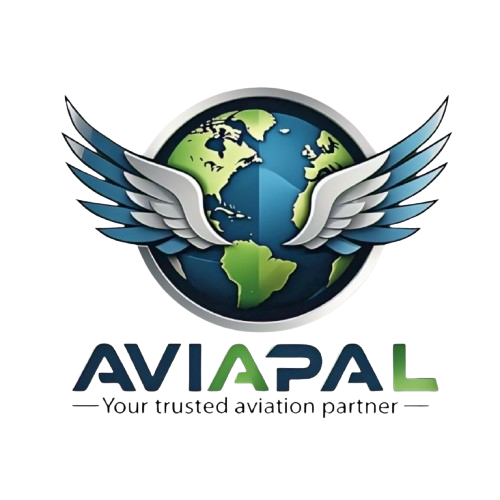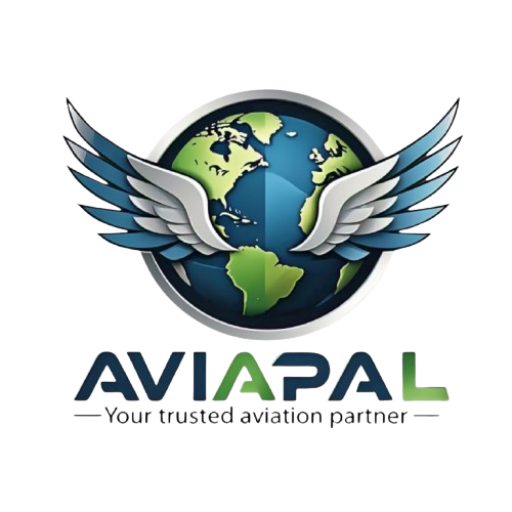Work With Us!
To effectively deliver the above comprehensive training programs, AviaPal Consultant Ltd requires instructors who are not only experts in their respective fields but also have substantial practical aviation backgrounds. Here’s a detailed set of requirements for the instructors:
General Qualifications:
- Must have practical aviation experience in relevant fields. Examples of acceptable aviation backgrounds include:
- Pilots (Commercial or Airline Transport Pilots)
- Aerospace Engineers (Airframe, Propulsion, or Avionics)
- Air Traffic Controllers
- Flight Dispatchers
- Aviation/Mining/Oil & Gas Safety Managers
- Aviation/Mining/Oil & Gas Maintenance Technicians
- Aviation/Mining/Oil & Gas Environmental Specialists
- The instructor should have at least 5 years of experience in the aviation sector, with specific exposure to the area they will be teaching.
- Must have practical aviation experience in relevant fields. Examples of acceptable aviation backgrounds include:
- Possession of relevant certifications such as:
- CAA, ICAO, FAA, or EASA certifications (where applicable)
- International Safety Management (SMS) Certification (ISO 45001 or similar)
- Quality Management System (ISO 9001 Lead Auditor Certification)
- Environmental Management System (ISO 14001 Lead Auditor Certification)
- Accident Investigation training or certification (e.g., from NTSB, ICAO)
- An academic background in aviation-related fields (e.g., aeronautical engineering, aviation safety, or aviation management) is highly desirable.
- Possession of relevant certifications such as:
- At least 3 years of experience in delivering Aviation/Mining/Oil & Gas -related training programs.
- Experience in instructing both individual and group sessions in a classroom or simulated environment.
- Familiarity with teaching tools such as learning management systems (LMS), virtual classrooms, and interactive workshops.
- Must be fluent in English, with the ability to explain complex aviation terminology and concepts clearly.
- Proficiency in other languages (e.g., French, Spanish) is an asset, particularly for international programs.
Program-Specific Instructor Requirements:
- Primary Experience: Instructors should have a solid foundation in aviation quality assurance and auditing. Ideally, they should have hands-on experience working with ISO 9001 in an aviation setting.
- Specific Qualifications:
- Experience in the implementation of Quality Management Systems in aviation operations.
- Certification as a Lead Auditor for ISO 9001 or similar quality management standards.
- Practical knowledge of aviation maintenance operations or flight operations from a quality control perspective.
- Primary Experience: Instructors should be seasoned professionals with in-depth knowledge of aviation safety and risk management.
- Specific Qualifications:
- Must have worked in a safety role in airline operations, airport management, or aircraft maintenance.
- Experience in the implementation of ICAO Annex 19 standards, SMS audits, and risk management frameworks.
- Certification in Safety Management Systems or Safety Auditing (ISO 45001, ICAO, or similar).
- Primary Experience: Instructors should have practical experience in crisis management and emergency response in aviation, ideally in an operational setting like an airport or airline.
- Specific Qualifications:
- Experience in managing or overseeing aviation emergency response procedures.
- Certification in Emergency Management or Crisis Communication.
- Involvement in conducting ERP drills or working with emergency responders in the aviation industry.
- Primary Experience: Instructors should have a background in aviation accident investigation, either from a regulatory body (e.g., NTSB, CAA) or an aviation operator's internal investigation unit.
- Specific Qualifications:
- Experience conducting aviation accident investigations or a similar forensic investigation.
- Certification in Aviation Accident Investigation or Human Factors related to aviation safety.
- Root Cause Analysis expertise, including techniques like Fault Tree Analysis or 5 Whys.
- Familiarity with ICAO Annex 13 regulations for accident investigation.
- Primary Experience: Instructors should have experience in aviation health and safety, including fatigue management, stress management, and occupational health for aviation personnel.
- Specific Qualifications:
- Background in aerospace medicine or aviation psychology.
- Occupational Health and Safety certifications (e.g., OSHA, ISO 45001).
- Hands-on experience in designing and implementing health programs tailored to aviation workers (pilots, crew, ground staff).
- Primary Experience: Instructors should have strong experience with environmental management within the aviation industry, focusing on sustainable practices and ISO 14001 implementation.
- Specific Qualifications:
- Experience in environmental compliance and regulatory frameworks (e.g., ICAO Annex 16 and ISO 14001).
- Experience in carbon footprint analysis, green aviation practices, and pollution control.
- Certification as ISO 14001 Lead Auditor or equivalent environmental management training.
- Exposure to environmental risk assessments and sustainability audits within aviation operations.
Additional Skills and Attributes:
- Instructors must have strong presentation and communication skills to engage diverse learners in both theoretical and practical topics.
- Ability to mentor and guide learners towards professional development in aviation disciplines.
- Leadership qualities to handle both group and one-on-one training sessions.
- Instructors should engage in ongoing professional development to stay current with industry trends, regulatory changes, and new technologies in aviation.
Instructors should demonstrate the ability to address different learning styles and adapt course materials based on the needs of the participants.
An Aviation, Mining, Oil & Gas Auditor’s qualification in Quality, Safety, and Environmental Management Systems (QSEMS) is an advanced certification that demonstrates an auditor’s competency to assess and evaluate the operational practices, compliance, and management systems within industries such as aviation, mining, and oil and gas. The qualification is aimed at professionals responsible for auditing the effectiveness and compliance of quality, safety, and environmental management systems as per international standards such as ISO 9001, ISO 14001, ISO 45001, and sector-specific regulations.
Here’s a detailed breakdown of the qualifications, including required training, experience, and specific areas for each industry:
Basic Degree: A bachelor's degree in engineering, environmental science, occupational safety, aviation management, or related fields.
- Aviation: Aviation management, aerospace engineering, or relevant fields.
- Mining: Mining engineering, environmental science, or geological engineering.
- Oil & Gas: Petroleum engineering, chemical engineering, or environmental engineering.
An effective auditor in these industries must possess strong technical, analytical, and interpersonal skills. Key competencies include:
- Understanding of industry-specific regulations, standards, and compliance requirements.
- Knowledge of risk management and mitigation strategies.
- Familiarity with auditing tools and methodologies.
- Knowledge of continuous improvement techniques such as Six Sigma and Lean methodologies.
- Ability to communicate findings and recommendations effectively to senior management.
A. ISO Certifications
ISO 9001 Auditor Training (Quality Management Systems):
- Requirements: Training and certification on auditing quality management systems in accordance with ISO 9001:2015.
- Competency Focus: Quality management, performance evaluation, corrective actions, and audit planning.
ISO 14001 Auditor Training (Environmental Management Systems):
- Requirements: Training on environmental management systems based on ISO 14001:2015.
- Competency Focus: Environmental compliance, waste management, sustainability practices, and environmental risk assessment.
ISO 45001 Auditor Training (Occupational Health & Safety Management Systems):
- Requirements: Training on occupational health and safety management systems as per ISO 45001:2018.
- Competency Focus: Health & safety risk management, accident prevention, emergency preparedness, and workforce welfare.
Sector-Specific ISO Certifications:
- Aviation: ISO 9100 series (Aerospace Quality Management Systems), ISO 14001 (Environmental), and ISO 45001 (Safety) for the aviation sector.
- Mining: ISO 14001 (Environmental) and ISO 45001 (Safety) specific to mining operations.
- Oil & Gas: ISO 9001, ISO 14001, and ISO 45001 certifications tailored to the oil and gas sector.
B. Other Certifications:
- Certified Lead Auditor (CLA): For advanced skills in conducting audits across various sectors.
- NEBOSH (National Examination Board in Occupational Safety and Health): Certification in safety management for industries such as mining and oil & gas.
- Safety Management (OHSAS 18001): For broader safety system expertise.
A qualified auditor must understand the auditing process deeply, which includes:
- Planning: Establishing audit objectives, scope, criteria, and methodology, including risk assessments specific to each industry.
- Execution: Conducting audits on-site, reviewing records, interviewing personnel, and performing inspections to ensure the management system meets standards.
- Reporting: Preparing detailed audit reports that include findings, non-conformities, corrective actions, and opportunities for improvement.
- Follow-up: Ensuring that corrective actions are taken and verifying the effectiveness of implemented measures.
Aviation:
- Key Areas: Aviation safety management, air traffic control protocols, maintenance procedures, risk assessments, safety audits for airports, air carriers, and ground support services.
- Experience: Experience working with aviation safety regulations such as FAA (Federal Aviation Administration), EASA (European Union Aviation Safety Agency), or ICAO (International Civil Aviation Organization) standards.
- Training: Specific safety and regulatory compliance courses such as AS9100, FAA regulations, and aircraft operation protocols.
Mining:
- Key Areas: Mining safety regulations, environmental impact assessments, hazard analysis, and risk management practices tailored to underground and surface mining.
- Experience: Hands-on experience in the mining sector, including knowledge of MSHA (Mine Safety and Health Administration) and OHSAS regulations for safety.
- Training: Certification programs for mining safety management, environmental protection, and sustainability practices within the mining industry.
Oil & Gas:
- Key Areas: Offshore and onshore drilling safety, hazard identification and risk assessment, safety and environmental management systems (SEMS), oil spill contingency planning.
- Experience: Prior experience in the oil and gas industry, familiarity with HSE (Health, Safety, and Environmental) regulations, and ISO 14001 for environmental management in the sector.
- Training: HAZOP (Hazard and Operability Study), process safety, emergency response procedures, and environmental impact assessments specific to oil and gas operations.
Experience in conducting internal audits, assessing risk and compliance, and verifying adherence to QSEMS standards is crucial. Typical requirements include:
- 3-5 years of professional experience in the specific industry (aviation, mining, oil & gas) working with quality, safety, or environmental management systems.
- Experience in performing audit activities such as planning, executing, and reporting on audit findings.
- Participation in audit teams and direct involvement in corrective actions and continuous improvement initiatives.
Maintaining qualifications and staying up to date with evolving standards is crucial. Auditors should participate in ongoing professional development, including:
- Attending industry conferences and seminars.
- Pursuing advanced certifications in emerging standards or technologies.
- Regular training on sector-specific regulations (e.g., aviation safety regulations, oil spill response).
Maintaining qualifications and staying up to date with evolving standards is crucial. Auditors should participate in ongoing professional development, including:
- Attending industry conferences and seminars.
- Pursuing advanced certifications in emerging standards or technologies.
- Regular training on sector-specific regulations (e.g., aviation safety regulations, oil spill response).
Conclusion:
Becoming a certified Aviation, Mining, Oil & Gas Auditor in Quality, Safety, and Environmental Management requires a robust combination of education, training, industry-specific experience, and ongoing professional development. The qualification enables auditors to contribute significantly to improving operational safety, sustainability, and overall compliance in these high-risk industries. Properly trained auditors ensure that organizations maintain compliance with international standards while enhancing safety, quality, and environmental performance.

